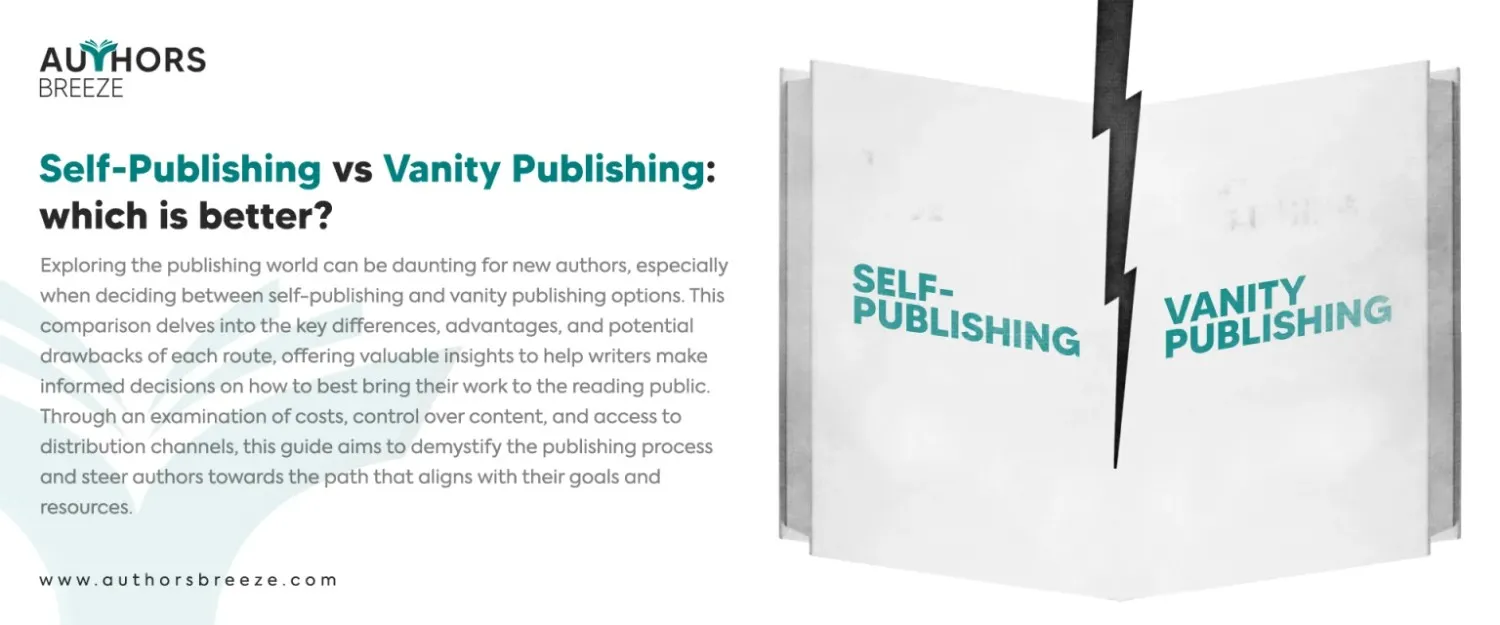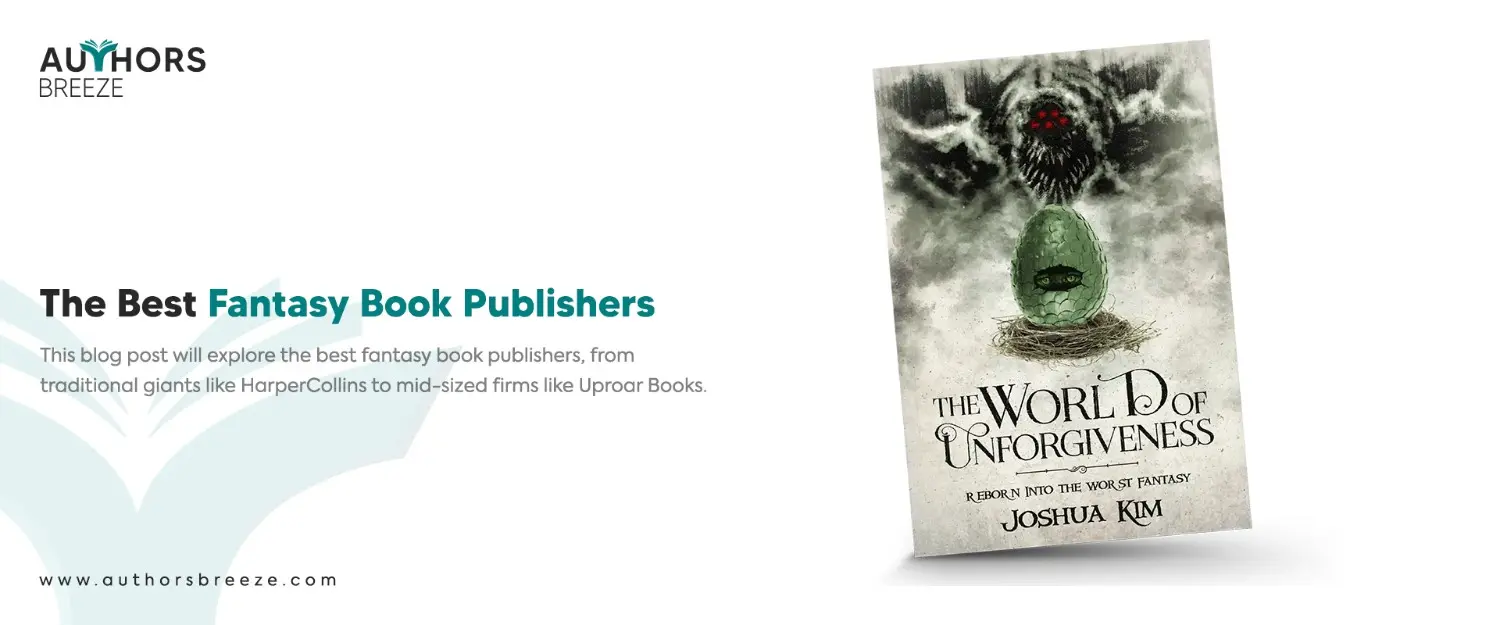Don’t Have Time to Read? Listen to this Article on Self-Publishing vs Vanity Publishing Instead!
Key Takeaways:
- In vanity publishing, authors pay for publication services without guaranteed market success, facing high costs and the potential for low returns on investment.
- Self-publishing offers authors full control over the publishing process, with lower costs and higher potential royalties, but requires significant effort in marketing and distribution.
- Self-publishing often results in higher financial gains and more creative freedom. In contrast, vanity publishing can be costly, with limited control over the final product.
- Self-publishing allows for direct audience engagement and market alignment, potentially leading to better success compared to the limited influence and market reach of vanity publishing.
- The choice between self-publishing and vanity publishing depends on the author’s goals, resources, and preference for creative and financial control, with self-publishing offering a more empowered route for motivated and resourceful authors.
The publishing has become a giant industry in recent years. It has offered authors more pathways to see their work in print than ever before. Two of these pathways, self-publishing and vanity publishing, have generated much discussion among authors.
Suppose you understand the nuances of writing and publishing. In that case, it can help you make informed decisions about which route to take. The objective of this blog post is to explain the distinctions between self-publishing and vanity publishing. We will lay out the critical factors authors should consider when they plan to publish their book.
What is Vanity Publishing? Let’s Understand
What is a Vanity Publisher?
A vanity publisher, or vanity press, operates on a business model where authors pay to have their books published. It is not like traditional publishing, where the publisher bears the costs of publication and pays the author royalties. A vanity publisher charges the author for the price of publishing the book.
What is a Vanity Press?
A vanity press is a publishing house that charges authors fees to publish their books. It can include a range of services, including:
- Editing
- Design
- Distribution
- Marketing
The term “vanity” means that these publishers cater to the author’s vanity or desire to see their work published.
Vanity Press Publishers and Vanity Book Publishers
Vanity press publishers vary widely in terms of:
- The quality they offer.
- The price at which they offer their services.
- Their services are offered.
Some of them may offer packages that handle all aspects of the book publishing process. At the same time, others might provide more flexible options. It may allow the authors to choose only the services they need. It is essential for authors to conduct thorough research to find a reputable vanity press. Search for those that match your goals and budget.
What is Vanity Publishing?
Vanity publishing often attracts confusion and misconceptions. It involves an author paying a company to publish their own book. Best vanity publishers charge their clients for various services. The services might include editing, cover design, printing, and marketing.
The key characteristic that defines a vanity publisher is the lack of selectivity in what they publish. They do not curate based on quality or market potential, as traditional publishers do. Instead, anyone willing to pay their fees can get published.
Get To Know Self-Publishing
What Does Self-Publish Mean?
To self-publish means to publish a book on your own without the involvement of a traditional publishing house or vanity press. It gives authors complete control over the publishing process. They have the power over writing, editing, distribution, and marketing. Digital publishing has lowered the barriers to self-publishing. This makes it a good option for many authors.
Self Book Publishers and New Author Publishing
Self-publishing platforms such as Amazon Kindle Direct Publishing and Smashwords have revolutionized publishing and distributing books. It has provided authors with tools to publish their books, market them, and sell them as well. Such means of publishing are particularly appealing to the new generation of authors who want to break into the publishing world, as they offer a direct path to readers.
Transform Your Manuscript Into A Masterpiece!
Collaborate with our expert publishing team and launch your book. Send your story across the globe, captivating readers everywhere.
What is Self Publishing?
On the other hand, self-publishing places the whole publishing process in the author’s hands. Authors who want to self-publish take on the roles of both writer and publisher. In this process, they are responsible for every aspect of the process, which includes:
- Editing
- Design
- Formatting
- Publishing
- Marketing
The rise of digital platforms and print-on-demand technology has made self-publishing more accessible, and it has become a great option for many authors.
Vanity Publishing vs Self-Publishing: A Comparative Analysis
Publisher Costs and Financial Considerations
One of the most significant differences between vanity publishing and self-publishing is the cost attached to it. In vanity publishing, authors pay in advance for publication services, with no guarantee of recovering their investments through book sales.
In contrast, self-publishing costs are usually lower, and authors can earn higher royalties per book sold, making it potentially more profitable if the book succeeds in the market.
Vanity publishers often charge high fees for their services, which can significantly reduce the author’s potential earnings. Self-publishing costs are borne by the author. However, they also retain a much larger share of the profits and offer potentially higher financial returns if the book sells well.
Publisher vs Author: Control and Rights
Self-publishing offers authors complete creative control and ownership over their book’s content, design, and distribution. Authors can make decisions based on their vision for the book and their understanding of their target audience. Self-publishing authors have full control over the creative and publishing process. It helps them make all decisions themselves or choose professionals to help them.
In contrast, vanity publishing does not give much control. Authors may have to compromise on certain aspects of their book to fit the publisher’s requirements or package offerings. The vanity press takes over the production of the book, but at a significant cost to the author and often without the same level of personal investment in the book’s success.
However, in traditional and vanity publishing, authors might give up some rights to their work. It depends on the terms of their publishing contract. This can include rights to certain formats and languages. Self-publishing authors retain all rights to their books. It allows them to explore various distribution channels and formats and even sell the rights to other publishers or media producers in the future.
Quality and Reputation
The quality of services offered by vanity publishers can vary widely. Some may not provide the level of professionalism and polish that can be achieved through self-publishing by hiring experienced freelancers. Furthermore, the stigma attached to vanity publishing—due to its pay-to-publish model—can affect an author’s reputation and the book’s reception in the market.
Market Success and Creative Control
Self-publishing offers authors more opportunities for creative control and direct engagement with their audience. It often leads to better market alignment and potential success. Vanity publishing, however, can limit an author’s ability to influence the final product and its marketing. It potentially hinders the book’s ability to reach its intended audience.
Perfect Your Book’s Presentation!
Work with our specialists for top-tier book formatting services. Ensure your book stands out with a flawless layout and design that captivates readers from the first page.
What Does Self-Publish Mean for Authors Today?
Self-publishing means empowerment and responsibility. Authors have unprecedented access to resources and tools that allow them to publish books that can compete with traditionally published titles in terms of quality and market presence. It also means authors must be willing to learn and manage the business side of publishing.
The Pros and Cons of Vanity Publishing And Self Publishing
Pros of Self-Publishing
Control Over Publishing
One of the most significant advantages of self-publishing is the creative control it offers. Authors have the freedom to do everything with their book, which includes:
- Create their narrative
- Design their book’s cover
- Decide on the book’s layout without external restrictions
This level of control ensures that the final product remains true to the author’s original vision, something that is often compromised in traditional publishing, where editorial and marketing teams have a say in the final output.
Higher Profit Margin
Another great benefit is the potential for higher royalty rates. It is not synonymous with traditional and vanity publishing, as authors receive a relatively small percentage of the sales revenue. Self-publishing platforms usually offer much more favorable royalty structures.
Authors can retain up to 70% of the sales revenue. It depends on the platform and pricing strategy. This higher earning potential is a significant draw for authors who are looking to maximize their earnings from their work.
Fast Process
Self-publishing offers speed to market, an essential factor in the industry. Traditional publishing can be a lengthy process and often takes years from manuscript acceptance to bookshelf. On the other hand, self-publishing allows authors to bring their work to readers much more quickly. It can sometimes take as little as months or even weeks. This can be particularly advantageous for timely topics or market trends.
Cons Of Self-Publishing
Advance Payments
One of the most daunting is the advanced costs involved. Contrary to traditional publishers, who assume the financial risk of publishing a book, self-published authors must cover the expenses for cover design, editing, formatting, and marketing out of pocket. These costs can add up quickly and represent a significant barrier to entry for some authors.
Burden Of Marketing
Self-published authors are responsible for getting their books into the hands of readers. It requires a solid marketing strategy and access to distribution channels without the support of a publishing house’s marketing machine. Authors must manage online and offline marketing, social media, and book distribution networks on their own.
A Call For Concern
There remains a stigma associated with self-publishing, rooted in the perception that self-published books are somehow inferior to those published through traditional channels. You should also avoid some of the known self-publishing companies. Self-publishing companies to avoid are those that promise unrealistic results, demand high advance fees, and more.
Pros Of Vanity Publishing
Professional Assistance
Vanity publishing companies provide authors with access to various services, including:
- Editing
- Design
- Formatting services
These services can significantly enhance the quality of the final product. This can be a valuable benefit for authors not familiar with the publishing process or those who prefer not to manage the publishing.
Some Marketing Support
Depending on the package purchased, authors can receive marketing and promotional services, which include:
- Press releases
- Book signings
- Social media promotion
This support varies widely among vanity publishers, but it can offer authors a leg up in getting their books noticed.
Easier Publishing Process
By handling the tasks of the publishing process, vanity publishers make it easier for authors to get their books published. It can be good for first-time authors or those who wish to focus solely on writing without the distractions of the whole process.
Cons Of Vanity Publishing
High Costs with Potentially Low Return on Investment
The costs associated with vanity publishing can be extremely high, with authors spending thousands of dollars to get their books published. The return on this investment is also not guaranteed. The reason is that the books published through vanity presses may not achieve significant sales.
Questionable Marketing Efforts and Sales Support
Some vanity publishers offer marketing services. However, they can be ineffective. Authors may find that the marketing provided is minimal or ineffective. In addition, the sales support offered by vanity publishers may not be as strong as that provided by traditional publishers.
Risk of Unethical Practices
The vanity publishing industry has been criticized for exploiting new authors. Some vanity publishers have been accused of unethical practices as well. Moreover, there remains a stigma attached to vanity publishing, with some viewing it as a less legitimate or credible publishing option.
Choose the Right Path for Your Book
The decision between self-publishing and opting for a vanity publisher should be based on an author’s goals, resources, and commitment to the publishing process. If you value creative control and higher earnings potential, then self-publishing will be more rewarding.
However, if you prefer a more hands-off approach, despite the higher costs and potential drawbacks, then you may opt for vanity publishing.
Make Your Decision: Self-Publish or Publisher?
Is It Better to Self Publish or Get a Publisher?
The answer to this question depends on the author’s goals and resources. Self-publishing may be better for authors who want complete control over the publishing process, are willing to invest their time and money into marketing, and prefer the potential for higher royalties.
Vanity publishing might be good for those who wish to avoid the complexities of the publishing process and are willing to pay for convenience and value having a publishing team handle the details.
Can You Publish a Book Anonymously?
Both self-publishing and vanity publishing allow authors the option to publish anonymously or under a pen name. This can provide authors with privacy and the freedom to explore different genres or topics without affecting their personal or professional reputation.
Is Publishing a Book Hard?
Publishing a book can be challenging, regardless of the path chosen. Each path has its hurdles, from the steep learning curve and marketing demands of self-publishing to the costs and potential quality concerns of vanity publishing. Success in publishing requires dedication, research, and a willingness to manage the technicalities of the book industry.
Boost Your Book’s Visibility!
Collaborate with our book marketing experts to amplify your book’s reach. Watch as your book captures attention and engages readers across the world.
Frequently Asked Questions
What is the meaning of vanity publishing?
Vanity publishing refers to a specific type of publisher that caters to authors sending their manuscripts and then charging them a specific amount or co-payment to assess or publish their books.
Is self-publishing the same as vanity publishing?
Self-publishing and vanity presses are very different in many ways. The core difference between self-publishing and vanity presses is who controls the publishing process. The whole process includes editing, proofreading, layout, cover design, printing, distribution, marketing and promotion.
What are the best publishers for first-time authors?
Some publishers are known for their support and opportunities for debut authors. Here are a few reputable options:
- Chronicle Books
- Flashlight Press
- Skyhorse Publishing
- Free Spirit Publishing
- Five Star
How do you spot a vanity publisher?
There are some factors to look for to spot a vanity publisher. Below are some of the factors to look for:
- Charging suspicious fees.
- Compromising on the quality.
- Offering unethical contracts.
- Making false promises.
- Chasing authors to publish their work.
Conclusion
The debate between self-publishing and vanity publishing is not about which is better. It is rather about which is better for you as an author. Both offer opportunities and challenges. The best choice depends on what you are prepared to invest in and what you hope to achieve with your book.
By understanding the differences of each publishing option, authors can make better decisions that align with their goals and lead to successful publishing. No matter what you choose, self-publishing or navigating vanity publishing, it does not really matter. The key to success lies in approaching your publishing journey with knowledge, preparation, and dedication.
If you are finding a publisher for your book then we suggest checking out our impeccable services. Authors Breeze offers the best publishing services with budget-friendly packages. We are a trusted publisher by all of our loyal clients. You can consult us for the best book publishing services.






